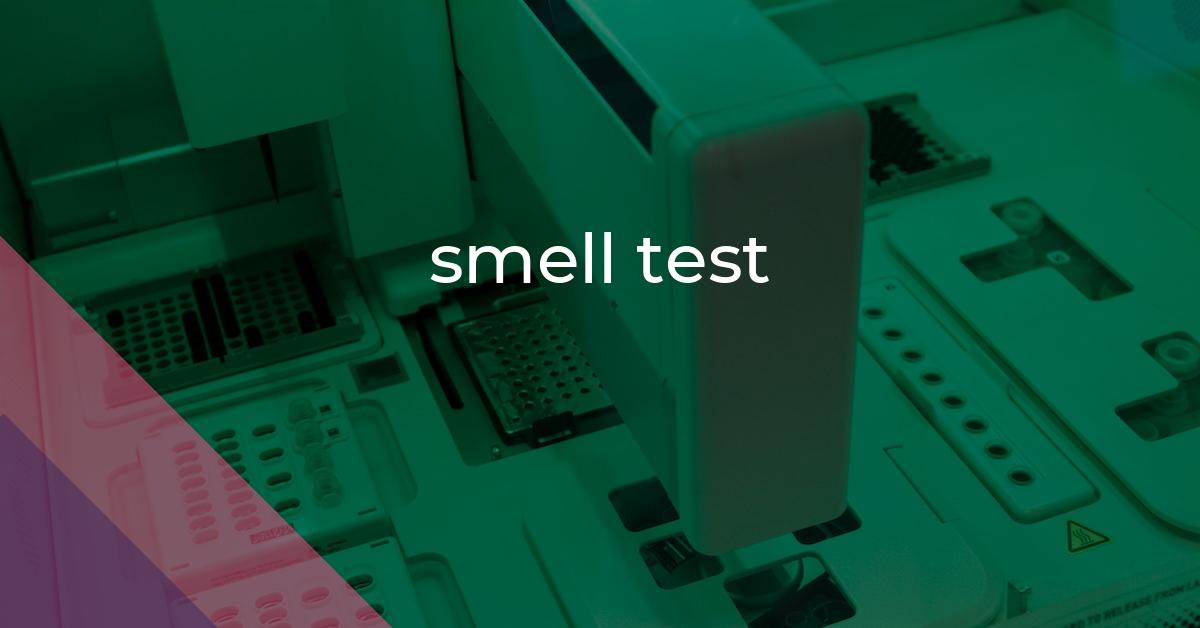smell test: Idiom Meaning and Origin
What does ‘smell test’ mean?
The idiom "smell test" refers to a method of determining the legitimacy or truthfulness of something, often relying on one's intuition or common sense. It implies using one's sense of smell figuratively to detect any possible issues or inconsistencies.

Idiom Explorer
The idiom "the nose knows" means that one's sense of smell can accurately detect or recognize something, even when other senses or evidence may be lacking.
The idiom "test the waters" means to try something cautiously or to gather information before making a decision or taking action.
The idiom *test bed* refers to a situation or environment where new ideas, technologies, or theories are tested or experimented with. It serves as a platform for evaluating the feasibility or effectiveness of something before implementing it on a larger scale.
The idiom "tell you the truth" is a way to emphasize honesty in a statement, suggesting that the speaker is about to share their true thoughts or feelings on a matter. It signifies a candid and sincere expression.
The idiom "tell the truth" means to be honest and not lie or deceive. It is often used in the context of revealing or sharing accurate information or facts without any distortion.
The idiom "tell apart" means to distinguish or recognize the difference between two or more similar things or people.
The idiom "take someone's word for it" means to believe or trust what someone says without requiring further proof or evidence.
The idiom "take check" means to carefully consider or think about something before making a decision or taking action.
The idiom "take a look" means to examine or observe something briefly or quickly.
Uncovering Origins: *Smell Test*
The idiom "smell test" is a commonly used phrase in American English. It is a metaphorical expression that originates from the sense of smell, which is closely linked to human instincts and the ability to detect potential problems or issues. The "smell test" refers to a quick assessment or evaluation of something to determine its authenticity, trustworthiness, or validity.
One of the primary attributes of the "smell test" idiom is its association with the idea of intuition or gut feeling. It implies the use of one's senses, particularly smell, to detect something fishy or suspicious. This could be applicable in various contexts, such as evaluating the credibility of a statement, the legitimacy of a product or service, or the integrity of a person. The notion of the "smell test" is rooted in the concept of relying on one's instincts and common sense to identify potential issues or deceit.
The phrase "smell test" can be traced back to the mid-20th century, although its exact origin is uncertain. It is believed to have emerged in colloquial American English and gained widespread usage over time.
The "smell test" idiom has found its way into various domains, including journalism, politics, and everyday conversation. In journalism, it is often employed to describe the process of fact-checking and scrutinizing information to ensure its accuracy and truthfulness. The phrase can also be used in political discourse to question the legitimacy or plausibility of a proposed policy, decision, or action.
The idiom's components convey a sense of evaluation and judgment. The act of smelling serves as a metaphor for assessment, implying that one can figuratively detect any potential issues or red flags. It suggests a need for vigilance and critical thinking, urging individuals to trust their instincts and subject matters to scrutiny, rather than blindly accepting them.
The determination of whether something passes the "smell test" can vary from person to person, as individuals may have different thresholds for suspicion or skepticism. The idiom acknowledges the existence of differing opinions and perspectives, emphasizing the importance of critical thinking in evaluating information.
Now, let's explore how the "smell test" idiom is related to other idiomatic expressions:
The idiom "nose test" is similar to the "smell test" in that it refers to using one's senses, specifically the sense of smell, to assess or evaluate something. Both idioms suggest relying on instinct and common sense to determine authenticity or trustworthiness.
The expression "smell a rat" is also connected to the "smell test." It means to sense or detect that something is wrong or suspicious. This phrase highlights the idea that the metaphorical "nose" is able to detect potential problems or deceit.
Similarly, the idiom "the nose knows" conveys the notion that intuition or gut feeling, represented by the metaphorical nose, can detect hidden or underlying issues. It aligns with the concept of the "smell test" and emphasizes the importance of trusting one's instincts.
Lastly, the phrase "smell blood" is another related idiom. It refers to sensing or perceiving vulnerability or weakness in someone or something. This idiom suggests that one can instinctively detect an advantage or opportunity.
Overall, the idiom "smell test" has become deeply ingrained in American English, evoking the idea of intuitive evaluation and the detection of potential issues. Its metaphorical origin in the sense of smell adds depth to its meaning, highlighting the importance of instinct and common sense in navigating various aspects of life. While it is a commonly employed expression, its subjectivity fosters a sense of ongoing discussion and debate, making it a thought-provoking idiomatic phrase.
Example usage
Here are three examples of how the idiom "smell test" can be used in a sentence:
1. After hours of going through financial records, he finally found the discrepancy that didn't pass the smell test.
2. The politician's promises sounded too good to be true and didn't pass the smell test with the voters.
3. The used car salesman's story about the car's history didn't pass the smell test, so the buyer decided not to make the purchase.
More "Evaluation" idioms



